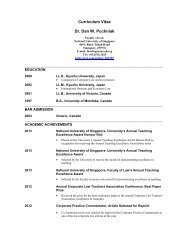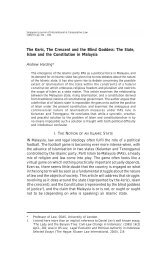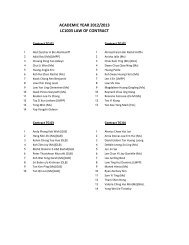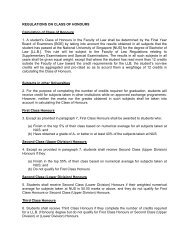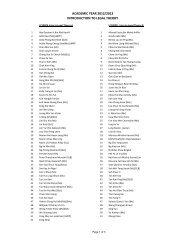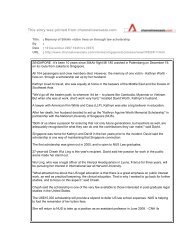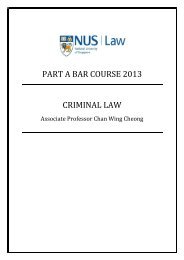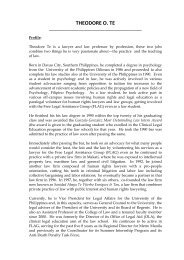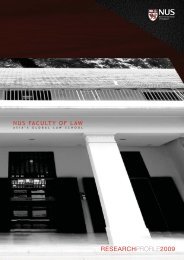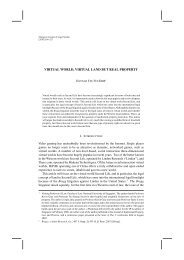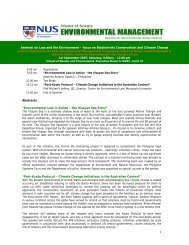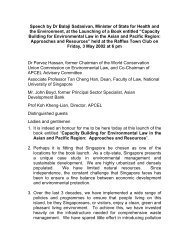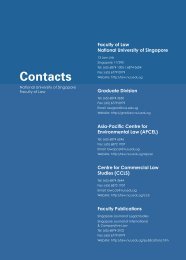Vol 3 No. 2 July - December 2004 - Faculty of Law - National ...
Vol 3 No. 2 July - December 2004 - Faculty of Law - National ...
Vol 3 No. 2 July - December 2004 - Faculty of Law - National ...
Create successful ePaper yourself
Turn your PDF publications into a flip-book with our unique Google optimized e-Paper software.
Q. As a member <strong>of</strong> the pioneer batch <strong>of</strong> <strong>Law</strong> Students,<br />
matriculating in 1957, you have been involved with<br />
the <strong>Law</strong> School since its inception and experienced<br />
it from all angles – as a student, a lecturer, the Dean<br />
and now Chairman <strong>of</strong> the International Advisory Panel.<br />
What are your feelings towards the <strong>Law</strong> School?<br />
A. I am a member <strong>of</strong> the pioneering class. As a group,<br />
we are probably more closely bonded than other classes.<br />
Why? Because we shared a special feeling that we<br />
were the path finders. We were going where no one<br />
else had gone before. We were also a relatively small<br />
class, with only 22 graduating in 1961. We knew one<br />
another very well. We tried to help one another in our<br />
studies. We were close to our teachers. My classmates<br />
and I have a very strong sense <strong>of</strong> commitment to the<br />
<strong>Law</strong> School.<br />
Q. When receiving the <strong>2004</strong> Outstanding Service<br />
Award, you said: “Academia is the only job I applied<br />
for. The other jobs have pursued me. I am like a fish<br />
swimming down the stream <strong>of</strong> life.” When you<br />
graduated from <strong>Law</strong> School, why did you not ‘go with<br />
the flow’ and embark on legal practice? What drew<br />
you to academia?<br />
A. I decided to pursue an academic career for several<br />
reasons. First, I believe in the high value <strong>of</strong> education.<br />
I regard teaching as a noble calling. Second, I have<br />
always been an idealistic person. I studied law not in<br />
order to make money but to fight against injustice. I<br />
felt that if I were practising law, my mission would be<br />
to pursue my client's interests rather than those <strong>of</strong><br />
justice. I felt that by being an academic, I could make<br />
the pursuit <strong>of</strong> justice my life-long mission. Third, I am<br />
not a typical Singaporean in that making money has<br />
never been on my agenda. My agenda is to build a<br />
better Singapore and a better world. I have been blessed<br />
with so many opportunities to serve my country and<br />
the world.<br />
Q. You are a champion <strong>of</strong> the arts in Singapore. Many <strong>of</strong> our local arts<br />
personalities are NUS <strong>Law</strong> School alumni (Singapore Dance Theatre<br />
founder member Jamaludin Jalil ’86, Theatreworks Artistic Director Ong<br />
Keng Sen ’88, founding Artistic Director <strong>of</strong> Wild Rice Ivan Heng ’88,<br />
comedienne/singer Selena Tan ’94, to name a few). We also count<br />
filmmakers (Sherman Ong ’95, Kelvin Tong ’97) among our alumni. What<br />
is the relationship between <strong>Law</strong> and the arts?<br />
A. It is true that there are several law graduates who have distinguished<br />
themselves in the arts. I do not think the study <strong>of</strong> law has made them<br />
creative. I would argue that they are creative in spite <strong>of</strong> their legal education!<br />
I used to blame my legal education for suppressing the poetry in my soul<br />
and for preventing me from writing fiction. However, the fact that Philip<br />
Jeyaretnam, Simon Tay ’86 and Eleanor Wong ’85 are successful writers<br />
show that if you have the talent, you can excel with both your left and right<br />
brain. The <strong>Law</strong> School has, over the years, attracted some very talented<br />
and versatile individuals. I greatly admire people like Jamaludin Jalil, Ong<br />
Keng Sen, Ivan Heng, Selena Tan, Sherman Ong, Kelvin Tong, and others.<br />
They are making an important contribution to our new ambition to raise<br />
our arts and culture to a level commensurate with our achievements in<br />
education, economy and infrastructure.<br />
Q. (On a possibly related note:) What are your thoughts on why so many<br />
law graduates in recent years have practiced for a few years and then<br />
left the pr<strong>of</strong>ession, or decided not to embark on legal practice at all?<br />
A. I have not studied the problem and do not really know what the answer<br />
is. I wish, however, to make a more general point about the fact that many<br />
law firms require their young lawyers to work late every night. This is both<br />
undesirable and unnecessary. We should try to maintain a balance between<br />
work and life. There is also a difference between putting in long hours<br />
and being productive. The simple fact is that the same job can be done<br />
by one person in two hours and by another in 10 hours. Our objective<br />
should be to work smart. When I was the head <strong>of</strong> our diplomatic missions<br />
in New York and, subsequently, Washington, I would urge my colleagues<br />
to leave the <strong>of</strong>fice by 7.00 pm so that they could go home to have dinner<br />
with their families. I also do this to all my <strong>of</strong>ficers in Singapore. A person<br />
who maintains a good balance between work and life, who has a happy<br />
family life and other joyful pursuits, is likely to be a more productive than<br />
another person who has no other life than work.<br />
Q. You wrote in “Change and Continuity” (Editor’s<br />
<strong>No</strong>te: the book produced in 1999 by the <strong>Law</strong> <strong>Faculty</strong>,<br />
to commemorate the 40th anniversary <strong>of</strong> the <strong>Law</strong><br />
School) that when you were Dean <strong>of</strong> the <strong>Law</strong> School<br />
(from1971 to 1974), you liked your students and knew<br />
each <strong>of</strong> your 400 <strong>Law</strong> students by name. In particular,<br />
you recounted: “My wife and I would invite the finalyear<br />
students, in small groups, to dine in our house<br />
with senior lawyers. We hosted a big welcome for<br />
each freshman class. We also hosted a farewell dinner<br />
for the graduating students, who would invariably<br />
consume all the liquor in our house.”<br />
Do you miss academic life, and the ability to interact<br />
with students so freely and directly?<br />
A. My wife and I were very happy at the University. If<br />
we had a choice, we would never have left to serve the<br />
country abroad. However, we were called to do so and,<br />
because we love our country, we were ready to accede<br />
to the request. I had always hoped that I would return<br />
to the <strong>Law</strong> School. For this reason, I have not resigned<br />
from the University and joined the Foreign Service or<br />
the Administrative Service. I would have benefitted<br />
financially if I had done so. Being the romantic that I<br />
am, I have allowed my heart to prevail over my head.<br />
Q. You have remained good friends with many <strong>of</strong> your classmates from<br />
your <strong>Law</strong> School days – for example, Attorney-General Chan Sek Keong<br />
’61, Pr<strong>of</strong>essor Koh Kheng Lian ’61, TPB Menon ’61, Dr Thio Su Mien ’61<br />
– and you are all prominent members <strong>of</strong> the legal fraternity. One might<br />
imagine that the sheer weight <strong>of</strong> your collective intellect would mean<br />
that your interactions were all <strong>of</strong> a serious and intellectual nature. While<br />
I am sure that you must certainly have had your fair share <strong>of</strong> grave<br />
discourses on the nature <strong>of</strong> law and justice (and oh, to have been a fly<br />
on the wall during those interactions!), what are your favourite memories<br />
<strong>of</strong> your days as a <strong>Law</strong> student? And what were some <strong>of</strong> the lighter<br />
moments?<br />
A. I remember my four undergraduate years as the golden years <strong>of</strong> my<br />
life. We worked hard but we also played hard. We were campus activists<br />
and played leading roles in the Students' Union, the Socialist Club, the<br />
Debating Union, and in running publications such as The Undergrad and<br />
Fajar. We did not spend all our time debating legal issues. We also made<br />
friends with students in other faculties and departments, such as, history,<br />
philosophy and literature. We spent long hours at the sarabat stalls, after<br />
the library had closed, debating issues about colonialism, capitalism versus<br />
socialism, the future <strong>of</strong> British Malaya and Singapore, the empowerment<br />
<strong>of</strong> workers and women, etc. The late 50s was a wonderful period to be<br />
on campus. We knew all the politicians and had access to them. We were<br />
participants in the making <strong>of</strong> history as some <strong>of</strong> the most important<br />
debates <strong>of</strong> our time were held on campus.



